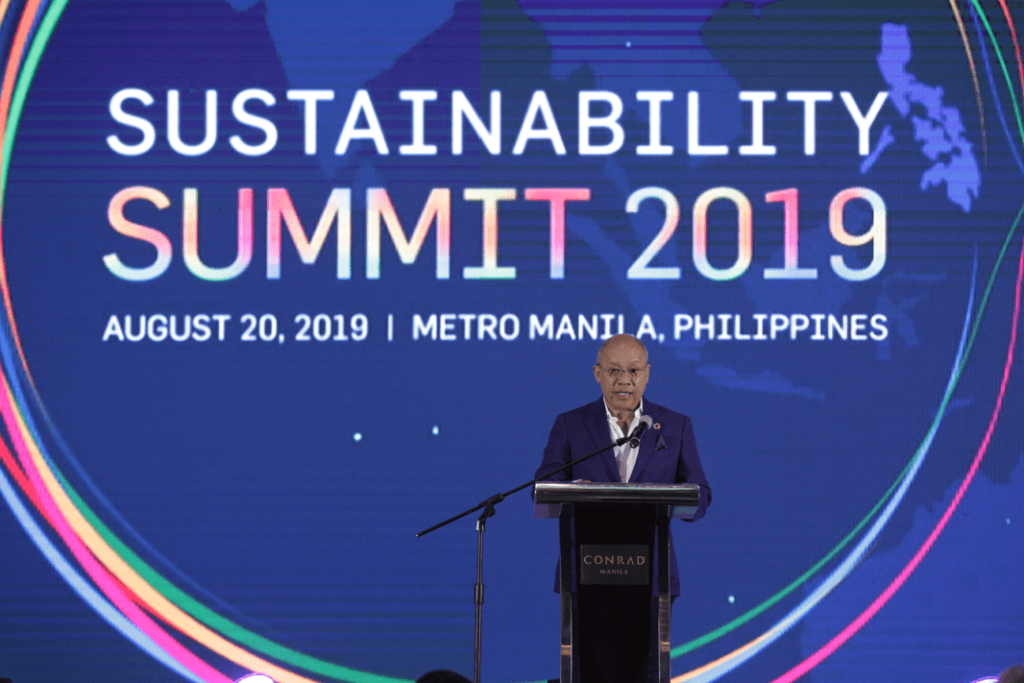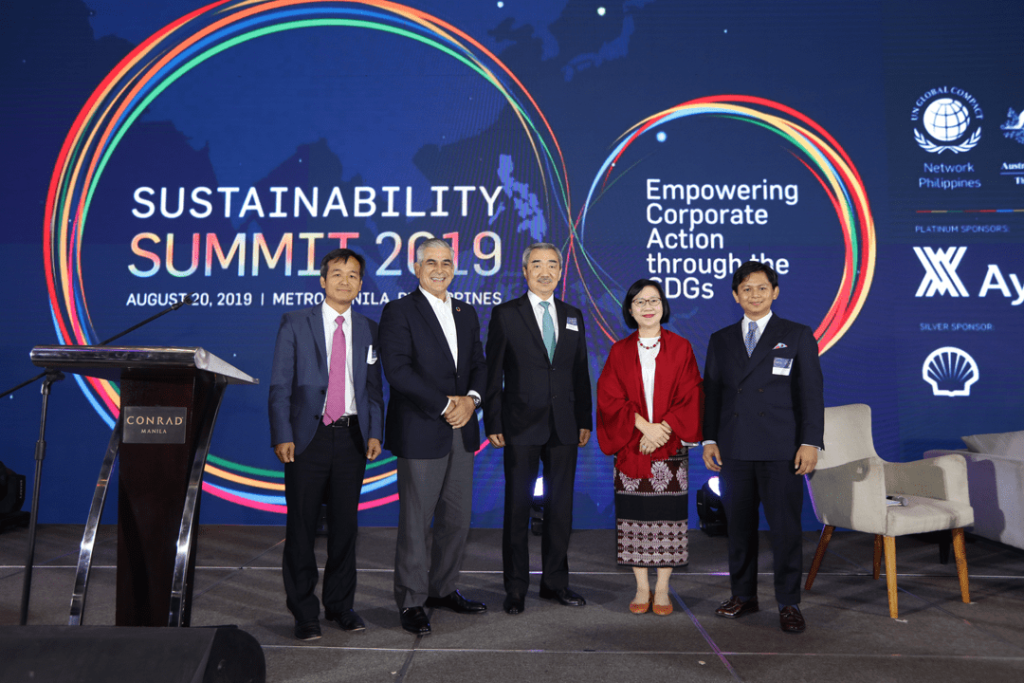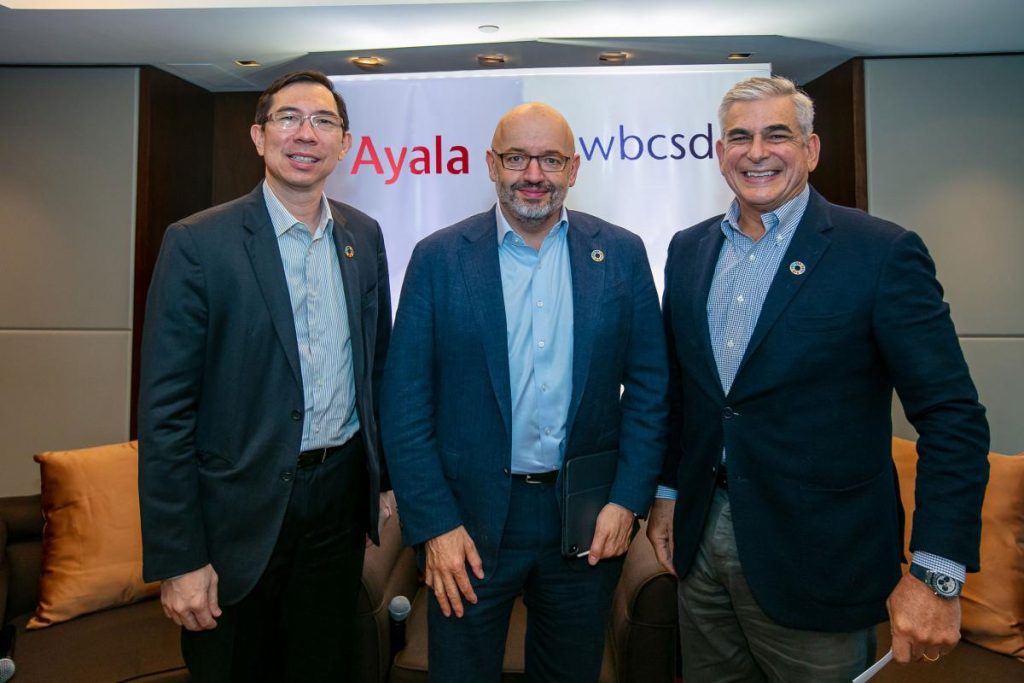JAIME AUGUSTO ZOBEL DE AYALA
UN GCNP AND GRI REGIONAL SUSTAINABILITY SUMMIT
August 20, 2019 | CONRAD HOTEL
PANELIST MESSAGE
_____________________________________________________________________________________________
Good morning to everyone.
I congratulate UN Global Compact Network Philippines and GRI for organizing this summit and bringing together members of the private sector to put emphasis on the topic of sustainability.
Today, let me touch on the Ayala group’s sustainability journey—the thinking behind our sustainability philosophy, the tangible ways we are supporting this framework, and some of the challenges that we face along the way.
In recent years, we have seen how the significant progress in our economy has yet to materialize in the lives of a majority of Filipinos. We have always believed that in a developing economy like ours, businesses play an indispensable role in helping address some of the most pressing social and economic development challenges. This is not just a responsibility of our governments. To remain relevant, to continue building trust with the communities we interact with, businesses must contribute to society as a whole, and be part of the progressive development of the markets they serve. In our case, Ayala has a presence in diverse industries that touch on important human needs—housing, water, telecommunications, financial services, transport, healthcare, and education. By integrating societal engagement into our corporate strategies, we believe we can play a role in alleviating some of the development challenges our country faces today. It has become clear to us that businesses cannot operate in a vacuum, linked only to communities through the investments they make, and the products and services they generate. The role of private enterprise needs to go beyond this. The development of our societies and economies in recent years has shown us that more is demanded from private enterprise as well. We need only look at the pockets of social tension that have risen around the world brought about by inequity, lack of opportunity, and the failure of many of our institutions to foster a more equitable and sustainable future. These issues have led to significant introspection across our leadership teams and led us to broaden our products and services with the aim of more formally contributing to greater economic and social inclusivity. Our group actively looks to identity opportunities for disruption in sectors that are undergoing pain points or challenges in affordability, quality, and accessibility.
On a personal note, these ideas began to percolate in my mind after I left business school in the late 1980s. While I continue to place great value on the education I received, at the time, it also occurred to me that a significant component of my studies was not necessarily relevant to the changing development needs of the Philippines. I would later meet a number of thought leaders who would expand on these ideas in new, progressive ways, like Harvard professor Kash Rangan, who spoke on doing business at the base of the economic pyramid before it became part of mainstream thinking. Similarly, Michael Porter, another Harvard professor, developed his thesis on “creating shared value” and provided a new business framework for these ideas and became a significant influence to our thinking across the Ayala group. Michael Porter defines “shared value” as policies and operating practices that enhance a company’s competitiveness, while advancing the economic and social conditions in the community where it operates.
This year, Ayala is celebrating its 185th anniversary, and looking back at our recent corporate history, we have evolved to put greater focus in terms of capital, time, and energy to truly align our business objectives with the social and economic development needs of the country. This philosophy has become a key part of our strategies and decision-making process. The United Nations Development framework and the Sustainable Development goals could not have come at a better time. It gave us a chance to align our new strategies with a broader global framework and set of objectives.
To institutionalize this, we designed a long-term sustainability blueprint that lays out actionable and measurable targets that address critical environmental, social, and governance gaps we face in our country today. We identified 1) marginalization, 2) large untapped potential of our human capital, and 3) irresponsible growth leading to long-term environmental damage as the three critical challenges our group will focus on.
The Ayala Sustainability Blueprint, specifically designed to support the achievement of the * UN Sustainable Development Goals by 2030, has allowed us to be more deliberate in monitoring and evaluating our sustainability targets and will help us allocate resources to these initiatives more appropriately. Moreover, this greater level of transparency leads to greater accountability on our part in executing on these aspirations. Under the blueprint, we will focus on contributing to the achievement of three pillars where we believe our businesses can generate the most significant and lasting impact. These are: 1) access and inclusivity, 2) productivity and competitiveness, and 3) responsible growth and innovation. Let me expand on this by citing examples of our initiatives across the Ayala group in support of these three pillars.
Let me start with the first pillar, namely access and inclusivity. While our country has shown consistent growth over the past decade, we face the challenge of seeing this progress materialize and spread to the lives of a much larger percentage of the population. We have always believed that in a developing economy like ours, businesses play an indispensable role in helping address this continuing challenge of closing income gaps and ensuring broad based development. We all know how the Philippines is entering a positive demographic growth pattern that has the potential to create a productive workforce over the next decade. However, we need to equip this young population with the relevant skills to prepare them for the disruptive changes in the employment requirements of the future. It is disheartening to see that the lack of sufficient access to affordable quality education has led to high dropout rates and quality issues across all educational levels in the country. At Ayala, we have seen this as an opportunity for positive engagement, and a chance to contribute to our country’s human capital development.
Through our APEC Schools, now the largest chain of stand-alone private high schools in the country, we are contributing to the education needs of those students who need to go on to college, or find entry level professional employment out of high school.
AC Health is establishing itself as a key player in the Philippine healthcare industry through its rapid expansion in preventive care, sale of affordable generic medicine, and health technology, with future investments into hospitals and specialty care. With 54 clinics, FamilyDOC is now the largest chain of primary care clinics in the country. Having served over 250,000 unique patients, it is focusing on preventive care at the primary care level, rather than just curative treatment. Similarly, Generika is expanding its wellness product offerings and health consultations at affordable price points.
The second sustainability pillar I want to highlight is productivity and competitiveness. The Ayala group has always supported the country’s efforts to develop its physical infrastructure, aligning our own strategy to support the government’s agenda.
From three major estates in the 1990s including Makati, Ayala Land now has * 26 estates spanning 57 growth centers nationwide. All these estates are sustainably and functionally designed, providing a better quality of life as well as economic progress within and around, those areas through employment opportunities and entrepreneurial activities. These estates feature Ayala Land’s different product lines—from residential, shopping centers, offices, as well as hotels and resorts. Moreover, our investments in hotels and resorts is contributing to the development of tourism as a growth engine for the country.
Ayala Land has expanded its portfolio to include affordable and socialized housing, launching two new residential brands, Amaia and Bella Vita, that cater to much lower consumer price points. In the telecom sector, Globe initially only targeted the top-end post-paid market, but over time aggressively expanded into the prepaid segment, which has allowed the company to give mobile access to a much larger percentage of the population.
Globe’s foresight and aggressive growth strategy has contributed to a digital revolution in the Philippines, changing the way Filipinos connect and altering their consumer preferences. As early as 2010, Globe had already seen the market shift towards smartphones and data. It is continuously investing and upgrading its network while ramping up its digital content offerings to connect a greater number of Filipinos to the internet and even make financial services more accessible across a broader demographic.
AC Infra continues to help augment the increasing infrastructure capacity requirements as a result of a growing digital economy.
Last year, it set up Entrego, a logistics and fulfillment solutions platform, to capture the strong growth of e-commerce in the Philippines. Entrego is expanding its presence nationwide with its 64 hubs covering 95 percent of the country, serving clients in various industries such as e-commerce, fintech, telco, and financial services. Moreover, we are proud to say that the Ayala group is one of the largest employers in the country, providing * employment opportunities to over 130,000 individuals. We have always regarded our human capital as one of our country’s strongest competitive advantages as a country. Filipinos are well-regarded internationally for our resilience, flexibility, and creativity. Through our investments, we hope to be able to harness the full potential of Filipinos’ natural strength by helping nurture their intellectual, mental, and physical well-being.
A final touchpoint on the second pillar of contributing to productivity and competitiveness can be seen in BPI’s business transformation. BPI’s digital transformation is addressing financial inclusion as it facilitates higher engagement with the unserved and underserved segments of the population, particularly the micro, small, and medium enterprises and the lower-income consumer segments. With increased efficiencies and lower cost, digitalization will make financial inclusion for more sustainable. In addition, BPI continues to ramp up its microfinance arm, BPI Direct BanKo. Since its creation three years ago, BanKo has disbursed loans amounting to over 4 billion pesos to nearly 56,000 entrepreneurs. Its number of branches has grown to 250 by today. BanKo is targeting to grow its loan portfolio by six to seven times by 2022. Globe Telecom is doing the same, through new channels, by its launching Mynt, its joint venture with Ant Financial from China.
The third and final pillar that I want to discuss is our desire to contribute tangibly to responsible growth and innovation. Part of creating sustainable long-term value is holding ourselves accountable not only for our impact to our stakeholder community but to the broader physical environment within which we operate. In recent years, we have increasingly placed a higher importance on how we can contribute to achieving a low carbon and climate resilient environment.
Over the past couple of years, AC Energy has deliberately redesigned its strategy to focus on renewable energy. It can be recalled that we entered the sector at a time when the Philippines was faced with a looming power shortage and needed reliable and affordable baseload capacity. Since then, the economics, efficiencies, and the ability to build renewable technology to scale has improved significantly. AC Energy is taking advantage of this opportunity and has since over weighted its investments in this space, particularly in the solar, wind, and geothermal sectors.
In 2018, it generated *2,800 gigawatt hours of attributable energy, *48 percent of which came from renewable sources.
AC Energy is committed to scaling up its renewables portfolio and has set a target to achieve 5 gigawatts of capacity across various technologies by 2025, with renewables *contributing at least 50 percent of total energy output. In addition, the 410 million dollar Green Bond it raised early this year, a first in Southeast Asia, will be used to fund renewable energy projects.
AC Industrials also continues to assemble a portfolio of global businesses in disruptive technologies in rapidly-transforming industries across the manufacturing and automotive sectors.
Finally, two years ago, Ayala Land announced a target for its commercial properties to achieve carbon neutrality by 2022. We are happy to report that 62 percent of its emissions are now offset by its 560-hectare carbon forest and its properties’ increased reliance on renewable energy sources.
Our biggest effort to help the environment is our Project Kasibulan. We endeavored to go beyond tree planting and instead, we paved the way for the private sector to adhere to reforestation and forest protection. We started this initiative in North Luzon, with the intention of expanding this nationally, we are now in the midst of starting phase 2 moving towards a vital part of Mindoro’s forest. With this effort, we hope to contribute to protecting the Tamaraws and the Philippine bird called the Luzon Bleeding Heart, both of which are considered critically endangered species.
Bottom line, looking at all our targets, we believe that our partnership with the UN Global Compact and our recent membership to the World Business Council for Sustainable Development will help us align ourselves more formally to this changing, progressive global agenda.
I hope that these examples from across the Ayala group give some color to our ambitious sustainability journey through 2030. We keep adjusting our business imperatives but I can only reiterate how the foundation of the UN Sustainable Developments goals has helped us in the re-alignment of our corporate initiatives.
These have allowed us to anchor our plans on the new global compact that must become part and parcel of how we all do our own small part to help reverse some of the negative aspects and challenges of our need for growth and development.
Thank you.



